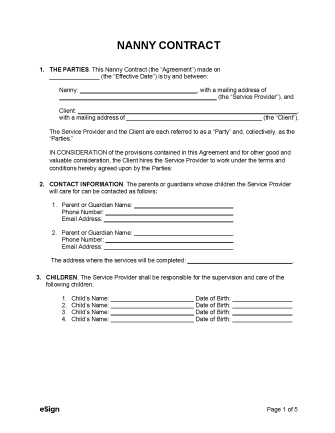Nanny Roles and Responsibilities
- Types of Nanny
- Nanny vs. Babysitter
What’s Included
- Party Information – The full name and mailing address of the nanny and the family. The contract should also include the parents’ phone numbers.
- Children Information – The name and date of birth of each child and any allergies the children have.
- Services – An overview of the services that the nanny will perform.
- Contract Term – The start date of the client-contractor relationship.
- Payment Details – The payment amount and method.
- Work Schedule – The days and hours the nanny will provide services to the family.
- Emergency Contacts/Protocol – The contact information of the individuals that the nanny should contact in an emergency and what actions should be taken.
- Independent Contractor Status – A provision establishing the nanny as an independent contractor.
- Signatures – The signatures of the nanny and the parents.
Why Use a Nanny Contract
Creating a nanny contract ensures both parties agree to the payment amount, work schedule, each party’s responsibilities, and all other terms of the working relationship . The contract serves as a reference point for how the nanny will carry out the job and what the client’s expectations are. Furthermore, a nanny contract is a legally binding document that can hold either party liable if they fail to uphold their agreed-upon responsibilities.
Nanny Roles and Responsibilities
A nanny provides child care when the parents cannot. The tasks a nanny might expect to carry out include preparing the children’s meals, transporting them to and from school, cleaning, cooking, and other day-to-day tasks.
Types of Nanny
Full-time:
- Live-in Nanny – Live-in nannies, as the name implies, live in the family’s household and handle their children’s daily supervision and care.
- Newborn Care Specialist – This type of nanny supervises newborns full-time for the first few months of their life and provides new parents information and advice on caring for a newborn.
- Education Support Nanny – Education support nannies assist children with schoolwork and tutor them on academic subjects. These nannies typically have a degree or credentials in education or teaching.
- Temporary Nanny – Temporary nannies are similar to traditional ones, except that they are contracted for shorter commitments, often to assist families during emergencies or periods when the parents are exceptionally busy.
Part-time:
- Night Nanny – Night nannies supervise children, typically those that are younger or newborns, during the night and are often hired by parents seeking to minimize their sleep disruptions due to attending to a child during the night.
Nanny vs. Babysitter
While nannies and babysitters share similar duties in that they supervise children, nannies are typically hired for longer terms, whereas babysitters work on-call. Unlike babysitters, nannies tend to develop relationships with children over an extended period and generally have more experience or credentials in child care.


